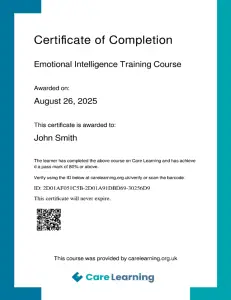Hearing impairments affect millions of people across the UK and can impact every part of life—communication, relationships, work, and accessing essential services. For those working in health and social care, understanding the challenges faced by people who use services with hearing impairments and knowing how to support them effectively can make a real difference.
This free hearing impairments online course is designed to equip you with the knowledge and tools needed to better understand hearing impairments, communicate effectively, and improve service provision. Whether it’s learning about British Sign Language, recognising communication barriers, or understanding the law, this course will help you build confidence and practical skills to apply in your role.
Join today to expand your knowledge and make positive changes in the lives of the people you support.
Why Take This eLearning Course?
Hearing loss can make everyday interactions difficult, creating barriers to communication that many of us take for granted. For people who use services, these challenges can lead to feelings of isolation, frustration, and even mental health issues. As a social care worker, your ability to understand and support those living with hearing impairments can have a powerful impact.
Here are just some benefits of taking this course:
- Build confidence in your role: Learn about hearing impairments and how they affect communication and daily life. You’ll gain practical tools to use in conversations, assessments, and care planning.
- Improve outcomes for people who use services: Better communication means better care. By learning effective strategies, you can help remove barriers and create an environment that meets individual needs.
- Stay informed about UK legislation: This course outlines the legal responsibilities in England for making reasonable adjustments to support people with hearing impairments, ensuring you comply with requirements like the Equality Act 2010.
- Access practical strategies: From basics like maintaining eye contact to learning British Sign Language, you’ll gain skills to use during everyday interactions and in wider service delivery.
With this free course, you will learn how to approach hearing impairments with understanding, empathy, and practical solutions tailored for the social care sector.
Learning Outcomes
By the end of this course, you will:
- Define hearing impairments and explain the differences between deafness and being hard of hearing.
- Recognise the causes and types of hearing loss, including conductive, sensorineural, and mixed hearing loss.
- Understand how hearing impairments impact communication and identify strategies to improve conversations.
- Learn practical tips for communicating effectively, like reducing background noise and using assistive technology.
- Explore legal frameworks, including your responsibilities under the Equality Act 2010 and the Accessible Information Standard.
- Identify communication barriers and discover simple solutions, like using visual aids or adaptions in care settings.
- Gain an introduction to British Sign Language (BSL), including basic signs and fingerspelling.
- Discuss the emotional challenges people with hearing impairments may experience, like feeling isolated, and learn ways to provide support.
- Understand how to assess the needs of people who use services with hearing impairments and adapt work environments to meet those needs.
- Develop strategies for improving service delivery through better communication methods, training, and early intervention.
This course focuses on giving you practical, easily applicable knowledge to improve your confidence, communication skills, and understanding of hearing impairments.
Hearing Impairments Awareness Course Content Outline
Module 1: Understanding Hearing Impairments
Learners will define hearing impairments and distinguish between deafness and being hard of hearing. They will explore the main types of hearing loss—conductive, sensorineural, and mixed—along with their common causes, including age-related, genetic, and environmental factors.
Module 2: Communication Methods and Strategies
This module introduces a range of communication methods used by people with hearing impairments, such as lip-reading, British Sign Language (BSL), and assistive technology. Learners will also gain practical tips to improve day-to-day communication, such as maintaining eye contact, reducing background noise, and using visual aids.
Module 3: Legislation and Rights
Learners will review key UK legislation, including the Equality Act 2010 and the Accessible Information Standard (2016). This module explains the legal duties of care providers to make reasonable adjustments and ensure equitable access to services for people with hearing impairments.
Module 4: Overcoming Communication Barriers
This module identifies common barriers faced by people with hearing impairments and offers solutions such as the use of interpreters, assistive devices, and inclusive communication practices. Learners will understand how to create environments that reduce barriers and promote inclusion.
Module 5: Introduction to British Sign Language (BSL)
Learners will be introduced to BSL as a fully recognised language in the UK. They will explore its importance in communication and practise basic signs and fingerspelling techniques to build confidence in engaging with BSL users.
Module 6: Psychosocial Impact of Hearing Impairments
This module explores the emotional and social challenges people face, including isolation, low self-esteem, and difficulties in education, relationships, and employment. Learners will understand the wider impact of hearing impairments on mental health and social participation.
Module 7: Improving Service Provision and Workplace Adaptations
Learners will review practical steps for improving care and support services for people with hearing impairments, from providing interpreters to making environmental adjustments. They will also examine workplace adaptations, such as induction loops, visual alerts, and staff deaf awareness training.
Module 8: Assessment and Ongoing Support
This module explains how to assess the needs of individuals with hearing impairments, focusing on communication preferences, accessibility, and barriers. Learners will also explore strategies for providing ongoing support, including early intervention, use of assistive technology, emotional support, and regular reviews.
Who Is This Course For?
This course is created for anyone working in the social care sector, from frontline carers and healthcare assistants to managers overseeing teams. It’s ideal for:
- Social care professionals looking to improve their understanding of hearing loss and communication.
- Healthcare volunteers supporting individuals who experience hearing challenges.
- Managers or team leaders interested in making their workplace practices more inclusive.
- Outreach workers engaging with diverse communities.
Whether you’re new to social care or you’ve been working in the field for years, this course will help you strengthen your skills and feel prepared to create an inclusive environment for people with hearing impairments.
FAQ
How long is the course?
The course is flexible, with around 2 hours of learning material, so you can complete it at your own pace.
Do I need a background in social care?
No previous experience is required! The course is designed to be simple, clear, and approachable for everyone.
Will I get a certificate?
Yes, once you finish the course, you’ll receive a certificate to show your knowledge and understanding of hearing impairments.
Is it really free?
Absolutely. This course is online and free, created to help professionals like you make positive changes in the lives of people you support.
Can I ask questions during the course?
Yes, you’ll have access to our team for any questions or concerns while completing the course.
Is this CPD accredited?
No, but it should be shortly.
Take the first step in improving your understanding of hearing impairments. This course empowers you to support people who use services with empathy and practical skills. Enrol today and start learning!
You must log in and have started this course to submit a review.
Hearing Impairments Training Course CPD Accredited and Government Funding
We’re working on getting this Hearing Impairments Training Course CPD accredited, and any course that’s approved will be clearly labelled as CPD accredited on the site. Not every health and social care course has to be accredited to help you meet CQC expectations – what matters is that staff are competent, confident and properly trained for their roles under Regulation 18. Our courses are built to support those requirements, and because they’re not government funded there are no eligibility checks or ID needed – you can enrol and start learning straight away.



